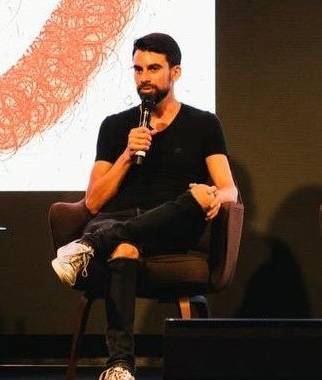 Back
Back
Psychedelics came to an Oxfordshire field (but the medics approved)
On September 18 2025, Harwell Science Campus hosted THE FIX, the VOYAGERS festival of health tech that explored the future of medicine and innovation. The programme included a special focus on psychedelics with its own tent, curated by Alex Adams, co-founder of the Psychedelic Action Task Force.

By Joe Rowan, September 4 2025 (updated October 6 2025)
On September 18 2025, Harwell Science Campus hosted THE FIX, the VOYAGERS festival of health tech that explored the future of medicine and innovation. The programme included a special focus on psychedelics with its own tent, curated by Alex Adams, co-founder of the Psychedelic Action Task Force.
“The main vision was to bring some of the most important visionary and informed voices in the psychedelic healthcare sector together,” Adams explains. “We want[ed] to demonstrate clearly why psychedelics are the most significant innovation in psychiatry for the last 50 years.”
At the heart of the strand was Adams’ Conversation Circle with Professor David Nutt titled Rethinking psychiatry: a new era for drug innovation?. “Professor Nutt is one of the world-leading experts in the field and a real veteran with many war stories,” Adams says. “He [looked] at the lack of innovation in psychiatry over the last 50 years and what we can expect once legislation has changed.”
For Adams, the urgency is clear. “Depression is the leading cause of ill health and disability globally when measured by years lived with disability,” he says. “Psychedelic treatments have been shown in numerous trials to be the most effective interventions, yet they are still illegal in almost every country.”
He also wanted to highlight overlooked areas where psychedelic research could transform care. “Palliative care, women’s health, and the cross-section of gut health are generally underrepresented,” Adams says. “These are areas where psychedelics may have a profound impact.”
Workshops at THE FIX brought these issues into focus. In Decoding Mushrooms: Chemistry, Perception, and the Entourage Effect, Theo Kelly guided participants through tastings of non-psychedelic mushroom coffee alternatives while comparing chemical profiles of psychedelic species. In their workshop Psychedelic integration, scientific spirituality and contemplative practice, Adam Barrett and Olivia Holtman explored how patients can integrate supposed spiritual insights from psychedelic therapy – combining Barrett’s work on the neuroscience of consciousness with Holtman’s hands-on experience in ketamine-assisted therapy and integration circles.
The strand also included Latent Relics, a collection of AI-generated video works by digital artist Vadim Epstein. By exploring the hidden aesthetic and semantic spaces within AI systems, Epstein offered a creative counterpoint to the scientific conversations of the day.
Adams sees psychedelics as a catalyst for nothing less than a paradigm shift. “The potential implications to healthcare of the clinical adoption of psychedelic therapies might not be too dissimilar from the advent of AI in terms of its effect on technology,” he says.
What he hoped most of all is that the festival would inspire action. “I hope it will light a fire under people,” Adams says. “The advent of psychedelic health care represents an opportunity to reduce suffering on an unprecedented scale.”